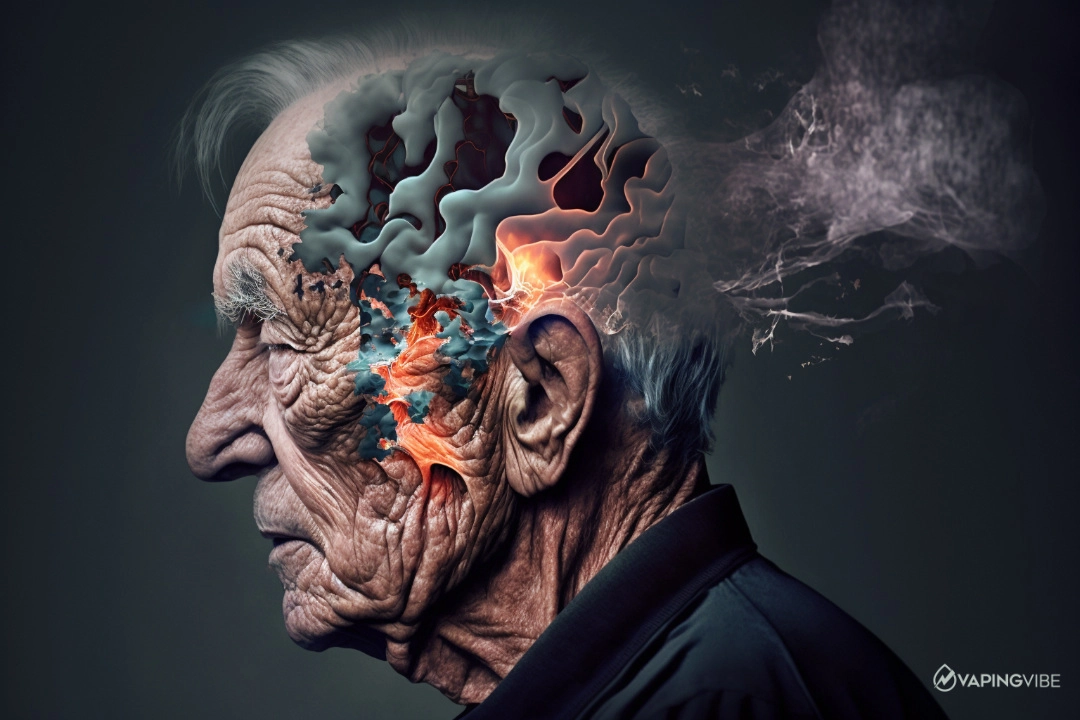QUICK LINKS
- Tobacco Vs Nicotine
- 12 Nicotine Benefits
- Nicotine and Parkinson's Disease Control
- Is Nicotine as Effective as Other Drugs in the Fight Against Parkinson's Disease?
- Nicotine and Obesity
- Nicotine and ADHD
- Nicotine and Reaction Time
- Nicotine and Athletic Performance
- Nicotine and Tourette Syndrome
- Nicotine and Schizophrenia
- Nicotine and Alzheimer's Disease
- Nicotine and Arthritis
- Nicotine Use and Ulcerative Colitis
- Nicotine Use As a Cognitive Enhancer
- Nicotine Use and Short-Term Memory
- So Why Does Nicotine Have Such a Bad Reputation?
- Wrapping Up
It is generally accepted that smoking cigarettes is bad for you, so it follows that nicotine dependence is detrimental to health, right?
It’s one of the main reasons that so many vapers are now switching to non nicotine vapes.
However, this might not be the case.
Believe it or not, studies have shown that there are positive effects of nicotine on the human body. It can improve cognitive function, reaction times, short-term memory, and long-term memory.
Shocked? So are we. Whenever the word ‘nicotine’ appears in the news, it seems to be surrounded by health problems and concerned parties. In fact, there are lots of ways that nicotine can benefit people who are suffering from terrible diseases. Nicotine benefits are not always plain to see, so we’ve created a list of our top 12.
Tobacco Vs Nicotine
Of course, when we talk about nicotine in a positive light, we are talking about it separate from tobacco.
Cigarettes contain tobacco leaves, which contain nicotine. One cigarette contains over 7,000 chemicals, 69 of which are known carcinogenic compounds, so it is no surprise that tobacco use is discouraged.
Vape juice, however, only contains nicotine. Vape manufacturers extract nicotine from tobacco plants and discard the plant. This eliminates most of the thousands of chemicals that are found in cigarettes.
Smokers might not be able to reap the benefits of nicotine, but vapers can.
Related article: Nicotine Withdrawal Symptoms and Timeline
12 Nicotine Benefits

Nicotine and Parkinson’s Disease Control
There are nearly 1 million people in the US living with Parkinson’s disease, a condition where the brain becomes progressively more damaged over several years. Tremors, muscular rigidity, and slow movements are just a few of the symptoms of Parkinson’s.
In 1966, an epidemiologist at the National Institute of Health called Harold Khan made a shocking discovery about nicotine. He looked at the health-insurance data on just under 300,000 veterans. All the veterans served in the U.S. military from 1917 to 1940.
Harold concluded that there was a higher mortality rate for smokers. Shockingly, Harold also found that non-smokers were 3x more likely to develop Parkinson’s than the smokers in the dataset.
This groundbreaking discovery required further probing. In 1980, Kessler and Diamonds put this theory to the test by analyzing a dataset of Baltimore residents who had Parkinson’s. They drew the same conclusions as Harold, and scientists soon discovered that nicotine molecules regulate the dopamine neurotransmitter in the brain. This transmitter does lots of things, including regulating movement.
In 2012, researcher Maryka Quik tested nicotine on monkeys with Parkinson’s disease and amazed the scientific community. After two months, the monkeys had half as many tremors and tics. Since this groundbreaking discovery, other scientists have produced similar studies and results. The conclusion is clear: even low doses of nicotine (a compound that was once thought to be a deadly, highly addictive substance) can protect against Parkinson’s disease.
Is Nicotine as Effective as Other Drugs in the Fight Against Parkinson’s Disease?
Nicotine might not be as effective as other drugs in the fight against Parkinson’s disease, but it does have its benefits.
As well as proving the positive benefits of nicotine on Parkinson’s disease, Maryka Quik also found that monkeys who were being treated with L-dopa (the standard drug for Parkinson’s) had a reduced chance of developing dyskinesia by up to 35%. Dyskinesia is a common side-effect of L-dopa. It involves involuntary and erratic writhing movements.
While nicotine might not be a good replacement for tried and tested Parkinson’s drugs, it might be a good addition for people who are struggling with unwanted side effects.

Nicotine and Obesity
Body weight is a hot topic, so it is no wonder that it has made its way into the world of smoking.
You might have noticed that people who smoke cigarettes are typically slim. Cigarettes decrease appetite; the nicotine binds to hypothalamic nicotine acetylcholine receptors, which activate pro-opiomelanocortin (POMC) neurons. One study activated these areas in mice, which, as a result, ate far less food and lost weight.
It is not just cigarettes that suppress appetite; all sorts of nicotine products have the same effect. Nicotine gum, nicotine patches, and e-cigarettes can help you curb your appetite. It is a life-saver for people who struggle with life-long binge eating disorders and food cravings.
Related article: How Long Does Nicotine Stay in Your System?
Nicotine and ADHD
4.4% of adults in the US have ADHD. Attention Deficit Hyperactivity Disorder has an impact on attention, concentration, focus, and task completion, among other things. Undiagnosed and untreated ADHD can alter an individual’s life and affect everything from work to relationships.
ADHD has no cure, meaning that people who have ADHD can only hope for coping mechanisms and medications that relieve their issues.
One study found that ‘Nicotine may increase attention and reduce hyperactivity and impulsivity’ which ‘may regulate behavior in individuals with ADHD.’ The same study noted that ‘nicotine is a stimulant, which may have properties similar to stimulant medications (e.g. Ritalin) used to treat ADHD).’ Whether or not nicotine is better for ADHD than popular medications is unknown. All we know is that nicotine mimics the function of many of these medications.

Nicotine and Reaction Time
One of the lesser-known health benefits of nicotine is the link to increased reaction time. One study found that nicotine reduces reaction time in a task that had four levels of choice-task complexity.
Another study found that nicotine decreases overall reaction times in covert orienting tasks. Covert orienting is the shifting of attention without eye or head movement.
Reaction times can be the difference between life and death, especially when it comes to driving. Covert orienting is very important while driving. Individuals who have good covert orienting can shift their focus from one obstacle to a new, more urgent obstacle without moving.
Better reaction times can help people who have poor cognitive function, such as those that suffer from Parkinson’s and Alzheimer’s Disease. Nicotine may be able to minimize the effects of these conditions for as long as possible to give the individual the best quality of life.

Nicotine and Athletic Performance
It is widely accepted that nicotine addiction can be fatal, but how about small doses of nicotine?
Health risks aside, nicotine has been tentatively linked to increased athletic performance. One study focuses on the performance of archery athletes. It found that ‘nicotine enhances the performance of archery athletes’ by ‘increasing cognitive function and stimulating the sympathetic adrenergic system.’
Toby Mundel reviewed findings from ten studies that assessed ‘muscular strength and power, sub-or maximal endurance and high-intensity exercise when nicotine (medication) or smokeless tobacco was used’. He concluded that ‘two studies observed an ergogenic effect, one an ergolytic with the remaining seven reporting no change.’ The effects of nicotine in relation to athletic performance still need to be tested, but there could be a link between e-cigarettes (or other nicotine delivery systems) and improved athletic ability.
Nicotine and Tourette Syndrome
Tourette syndrome primarily impacts the nervous system. Common symptoms include movements, sounds, and twitches that are often repeated against the individual’s will.
So, can tobacco products, electronic cigarettes, and other nicotine delivery systems reduce the impact of Tourette Syndrome?
Several studies discovered that nicotine treatment increased the chance of ‘up to 4 weeks neuroleptic-induced reductions of dyskinetic symptoms characterizing Tourette’s syndrome’. The University of South Florida College of Medicine conducted an adjacent study and found that a nicotine patch can boost ‘the effectiveness of drugs administered to relieve the involuntary movements of other symptoms of Tourette’s syndrome.’
Nicotine patches could greatly reduce the symptoms that Tourette’s sufferers deal with on a daily basis. Remember, you don’t have to inhale tobacco smoke to reap the benefits of nicotine. Vape juice doesn’t contain tobacco, but it does contain nicotine. It is a perfect alternative for people who want to avoid tobacco smoke.

Nicotine and Schizophrenia
Schizophrenia is a serious mental illness. People who suffer from schizophrenia tend to experience a breakdown between thought, emotion, and reason, which leads to faulty perception. Hallucinations, delusions, and violent behaviors are not uncommon in people who have schizophrenia.
When we dig into the facts, it is no surprise that nicotine alleviates the impact of schizophrenia. One study found that 88% of schizophrenic individuals are smokers, even when the data is adjusted for different socio-economic statuses. That’s three times as high as the generic public, suggesting that many schizophrenic individuals self-medicate with nicotine.
Scientists were quick to assess this theory. One concluded that ‘nicotine may improve performance in schizophrenia patients by enhancing activation of and functional connectivity between brain regions that mediate task performance.’ In other words, nicotine improves selective attention, which helps with task completion and focus.
Tobacco companies might not want the general public to know that there’s another path, but there is! E-cigarettes provide people with the same nicotine fix without health risks.*
*The link between vaping and cardiovascular diseases, lung cancer, and chronic obstructive pulmonary disease is tenuous. Some people argue that vaping is as bad as smoking and that there is just not enough evidence or studies for scientists to draw conclusions. You should beware of the health implications before you begin vaping.

Nicotine and Alzheimer’s Disease
Lots of people quit smoking to safeguard their health in their later years, but nicotine might actually have a positive impact on one of the biggest problems that older generations face. Alzheimer’s Disease is characterized by its degenerative effects on memory and motor abilities. More than six million Americans have Alzheimer’s Disease, with 73% being age 75 or older.
One research group discovered that nicotine prevents the beta-amyloid from aggregating. Nicotine acts as a binder. It binds to the soluble protein and prevents it from forming. In Alzheimer’s patients, this protein creates plaques that damage the brain.
There has been some debate around the validity of this seemingly hopeful study. Neil Buckholtz, director of Alzheimer’s research at the National Institute on Aging, argued that the concentrations of beta-amyloid and nicotine used in the study are much higher than those found in the brain.
Still, this tentative link could prove revolutionary for people who suffer from this uncompromising disease. Nicotine products could relieve (or even prevent) the symptoms of Alzheimer’s Disease.

Nicotine and Arthritis
Arthritis is caused by inflammation in the joints. It is most commonly seen in fingers, but it can affect any joints in the human body.
In the United States, 24% of adults have arthritis. That’s 58.5 million people! With so many people suffering, it’s no surprise that many individuals use tobacco products and nicotine products to lessen their pain.
But can nicotine help people who suffer from arthritis?
One study found that nicotine has anti-inflammatory qualities. As a result, nicotine may prevent joint inflammation and slow down (or stop) the development of arthritis.
Another study that analyzed the cross-section between e-cigarettes and inflammatory arthritis diseases found that ‘e-cigarette usage might be an important risk factor’ for the aforementioned diseases.
The evidence for or against using nicotine to treat arthritis isn’t conclusive, but it shouldn’t be ignored. Regardless, you can enjoy all the benefits of nicotine without smoking. People who quit smoking and switch to vaping soon become accustomed to their new nicotine delivery device, and they don’t have to worry about all the harsh chemicals that come with tobacco cigarettes.

Nicotine Use and Ulcerative Colitis
Ulcerative Colitis is similar to Crohn’s Disease. It involves chronic inflammation of the bowel, which can lead to a lot of the same symptoms. Diarrhea, rectal bleeding, weight loss, and fatigue are just a few of the unpleasant realities of this disease.
Strangely enough, tobacco plants can have a negative impact on people who have Crohn’s, but a positive impact on people who have Ulcerative Colitis.
If you have this condition, quitting smoking might not be the best option. People quit smoking to improve their health, but in this case, it could have the opposite effect. Ulcerative Colitis is less common in smokers than non-smokers, and some people have even developed the condition after quitting smoking.
There are lots of theories as to why nicotine gum and other nicotine products may have a positive impact on Ulcerative Colitis.
- Mucus – Nicotine may increase the production of a specific type of mucus in the colon and rectum. People who have Colitis have a thinner layer of this mucus.
- Nitric oxide – Nicotine releases nitric oxide, which has been tentatively linked to a reduction in muscle activity in the colon.
If you suffer from Colitis, nicotine might be worth trying. Of course, you have to be aware of all the other health risks associated with nicotine addiction.

Nicotine Use As a Cognitive Enhancer
We’ve already covered some of the research that presents nicotine as a cognitive enhancer, but what exactly is it?
Cognitive enhancers are also known as nootropics. They are drugs that treat cognitive impairment that results from dozens of well-known diseases including Alzheimer’s Disease, Schizophrenia, and ADHD as well as strokes and even just aging.
David M. Warbuton analyzed several relevant studies that explore the link between nicotine and cognitive function. He found that:
- Nicotine improves attention in a wide variety of tasks in healthy volunteers.
- Nicotine improves immediate and longer-term memory in healthy volunteers.
- Nicotine improves attention in patients with probably Alzheimer’s Disease.
As we can see, nicotine does not just improve the brain health of those who suffer from serious conditions. It can also elevate attention and long-term memory in healthy subjects.
Of course, the field of cognitive impairments is wide and varied. Even in ten years, there won’t be enough research and studies to accurately graph the impact of nicotine on these areas. Until then, niche studies and tentative hypotheses will have to suffice.

Nicotine Use and Short-Term Memory
Short-term memory is more important than you might think. It tells us where we’ve put our keys and whose turn it is to take out the trash. Basically, short-term memory is the ability to store small bits of information for a short amount of time.
One interesting study analyzed the link between nicotine gum and short-term memory. 60 non-smokers and 60 smokers performed a short-term memory task. Half the subjects chewed nicotine gum, and the other half chewed placebo gum before the task took place.
The study found that ‘nicotine significantly improves short-term memory.’ Additionally, there were ‘no significant differences between male and female subjects.’
Another study corroborated this conclusion by conducting a study with 10 smokers and 10 non-smokers. They were asked to take part in a short-term memory test, and they were given either nicotine gum or placebo gum at set intervals. The results were stark; ‘nicotine facilitates the processing of stimulus information in short-term memory.’
So Why Does Nicotine Have Such a Bad Reputation?
Maryka Quik (who is the director of the Neurodegenerative Diseases Program at SRI International and whose studies we have already looked at) outlines the issue.
‘”The whole problem with nicotine is that it happens to be found in cigarettes,”‘ Maryka told Scientific American. The public outcry against cigarettes has been well-documented, much to the dismay of the tobacco industry.
The World Health Organization (WHO) is just one of the government bodies that speak out against tobacco companies. Facts like ‘tobacco kills up to half its users’ are daunting, especially when organizations often don’t identify the difference between tobacco and nicotine.
Nicotine replacement therapy (NRT) is often the best option for people who want to experience the benefits of nicotine without consuming tobacco. NRT products include e-cigarettes, nicotine patches, and gum. By eliminating tobacco, you are eliminating a lot of the health problems that come with tobacco use. Then a clearer picture starts to emerge, and you can explore the benefits of nicotine.
Related article: Is Vaping Without Nicotine Safe?
Wrapping Up
It is hard to believe that nicotine can have such a positive impact on heart-wrenching diseases like Alzheimer’s and Parkinson’s, but the research doesn’t lie.
We are confident that nicotine has a positive impact on chronic health concerns, whether on its own or as part of a treatment plan in conjunction with other drugs. Of course, this might not be the end of the story. Scientists need to study nicotine far more to paint an accurate picture of the pros and cons.
As the scientific community points its focus to nicotine replacement therapy, we expect to see many more studies that corroborate the research that we’ve outlined today. For now, we implore you not to discount the benefits of nicotine based on the bad press associated with cigarettes.
Even with these benefits if nicotine, are worried that you might end up vaping too much? Read are article on whether you can vape too much.

